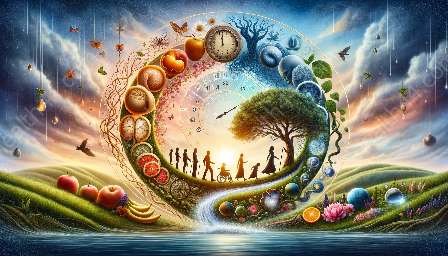Women face unique reproductive health challenges as they age, with issues like menopause, sexual health, and fertility becoming increasingly relevant. Understanding the impact of aging on reproductive health is essential for providing appropriate care and support. Explore the factors influencing reproductive health in relation to aging and learn about the experiences of older women in managing these challenges.
Menopause and Its Effects on Reproductive Health
Menopause is a natural biological process that marks the end of a woman's reproductive years. As women age, their ovaries produce fewer hormones, leading to the cessation of menstrual periods and the onset of menopause. This transition can bring about a range of physical and emotional symptoms that impact reproductive health.
The hormonal changes associated with menopause can lead to symptoms such as hot flashes, vaginal dryness, and mood disturbances. These symptoms can have implications for sexual health, affecting a woman's overall well-being and quality of life. It is essential for healthcare providers to recognize and address the reproductive health challenges that arise during menopause, offering support and tailored treatment options to help women navigate this phase of life.
Sexual Health and Aging
Sexual health is an integral aspect of overall well-being, and it is influenced by aging and reproductive health. As women age, changes in hormone levels and physical health can impact sexual function and satisfaction. Conditions such as vaginal atrophy, decreased lubrication, and changes in libido can affect the sexual experience for older women.
Addressing the sexual health needs of older women involves open communication and understanding of the physical and emotional factors at play. Healthcare professionals play a crucial role in providing education, counseling, and treatment options to support sexual well-being in the context of reproductive health and aging.
Fertility Challenges in Later Years
While menopause marks the end of a woman's natural reproductive capacity, the concept of fertility continues to be relevant for older women. Many women are delaying childbearing for various personal, social, and professional reasons, leading to an increasing number of women seeking to conceive in their later years.
However, advancing age can bring about fertility challenges, as the quality and quantity of eggs decline over time. This can result in reduced fertility and an increased risk of pregnancy complications. Understanding the limitations and possibilities of fertility in later years is important for older women who are considering parenthood or exploring options for assisted reproduction.
Managing Reproductive Health in Aging
Addressing the reproductive health challenges faced by older women requires a comprehensive approach that considers the physical, emotional, and social aspects of aging. Healthcare providers can play a key role in promoting reproductive health by offering preventive care, screening for age-related conditions, and providing individualized management strategies.
Educational initiatives and community support programs can also empower older women to take an active role in managing their reproductive health. By fostering awareness and understanding of the changes and challenges associated with aging, women can make informed decisions and seek the support they need to maintain their reproductive well-being.


